Nerine Dorman's Blog, page 46
March 27, 2016
Interstellar (2014) #review
A team of explorers travel through a wormhole in space in an attempt to ensure humanity's survival.
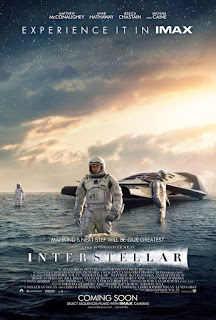 Interstellar was another of those films I swore I’d not go see, possibly mainly because of the hype. But then I discovered that Hans Zimmer did the soundtrack. Then I listened to the soundtrack and fell utterly in love. Zimmer wears his Philip Glass on his sleeve with this one, and if anyone’s seen
Koyaanisqatsi
they’ll understand the reference.
Interstellar was another of those films I swore I’d not go see, possibly mainly because of the hype. But then I discovered that Hans Zimmer did the soundtrack. Then I listened to the soundtrack and fell utterly in love. Zimmer wears his Philip Glass on his sleeve with this one, and if anyone’s seen
Koyaanisqatsi
they’ll understand the reference.
TBH, I couldn’t help but think about that Jodi Foster film Contact (1997) while I was watching Interstellar. Granted, I don’t remember much about Contact except that it left me feeling rather disappointed and that it tapped into some of the current pet conspiracy theories surrounding extra-terrestrial life.
Interstellar sucker punches the audience with its visual and aural elements. Apparently (and this is what I’ve heard anecdotally) the science behind the time dilation in the film all checks out. I wouldn’t know, since the whole relativity thing kinda does my head in, and I’m simply not motivated enough to get into arguments with people who know more about the subject than I do.
All I’ll say is that the narrative loop (because the story kinda loops into itself) was almost predictable. The actual premise of the story didn’t really blow my hair back, because I mean, really, if they have enough technology to send people through wormholes, then why the hell can’t they fix the blight that’s destroying all the food crops? Surely they’d have biodomes or synthesised food or something? But jawellnofine, don’t pay the author any mind. This is a film, and things get simplified for the sake of cinema.
At the heart of the story, however, there’s the troubled relationship between a father and his daughter. That kinda tugged on me hard and made me a wee bit choked up. Especially near the end. Daaaaamn. But then again, anything involving fathers and daughters and complicated relationships will hurt me because I can’t help but reflect on my own father and how much I miss the relationship I never really had. But this is neither the time and place for me to have a moment of existential wangst.
What Interstellar also succeeds in underscoring is exactly how hostile space is. These kinds of films never fail to instil a sense of claustrophobia in me – I’ve always been fearful of situations where people run out of vital resources like fuel or oxygen. There’s a predictable race against time by the end of the film that will leave most folks digging holes into the soft foam of their seats.
And then with regards to acting, I have to admit Matthew McConaughey is a very strange-looking man who, as an actor, has grown on me over the past few years. I quite enjoyed him in True Detective. I’m looking forward to seeing him The Dark Tower. He brings a certain dry, wry practicality to his roles that tickles me.
Would I watch Interstellar again? Probably not. It’s one of those life’s-too-short-to-revisit films, though I know there are others who’ll disagree. I’m kinda on the fence with this one, but I know I’ll be listening to the OST again and again, at full volume, because Hans Zimmer totally blew me out of the water. Again.
 Interstellar was another of those films I swore I’d not go see, possibly mainly because of the hype. But then I discovered that Hans Zimmer did the soundtrack. Then I listened to the soundtrack and fell utterly in love. Zimmer wears his Philip Glass on his sleeve with this one, and if anyone’s seen
Koyaanisqatsi
they’ll understand the reference.
Interstellar was another of those films I swore I’d not go see, possibly mainly because of the hype. But then I discovered that Hans Zimmer did the soundtrack. Then I listened to the soundtrack and fell utterly in love. Zimmer wears his Philip Glass on his sleeve with this one, and if anyone’s seen
Koyaanisqatsi
they’ll understand the reference.TBH, I couldn’t help but think about that Jodi Foster film Contact (1997) while I was watching Interstellar. Granted, I don’t remember much about Contact except that it left me feeling rather disappointed and that it tapped into some of the current pet conspiracy theories surrounding extra-terrestrial life.
Interstellar sucker punches the audience with its visual and aural elements. Apparently (and this is what I’ve heard anecdotally) the science behind the time dilation in the film all checks out. I wouldn’t know, since the whole relativity thing kinda does my head in, and I’m simply not motivated enough to get into arguments with people who know more about the subject than I do.
All I’ll say is that the narrative loop (because the story kinda loops into itself) was almost predictable. The actual premise of the story didn’t really blow my hair back, because I mean, really, if they have enough technology to send people through wormholes, then why the hell can’t they fix the blight that’s destroying all the food crops? Surely they’d have biodomes or synthesised food or something? But jawellnofine, don’t pay the author any mind. This is a film, and things get simplified for the sake of cinema.
At the heart of the story, however, there’s the troubled relationship between a father and his daughter. That kinda tugged on me hard and made me a wee bit choked up. Especially near the end. Daaaaamn. But then again, anything involving fathers and daughters and complicated relationships will hurt me because I can’t help but reflect on my own father and how much I miss the relationship I never really had. But this is neither the time and place for me to have a moment of existential wangst.
What Interstellar also succeeds in underscoring is exactly how hostile space is. These kinds of films never fail to instil a sense of claustrophobia in me – I’ve always been fearful of situations where people run out of vital resources like fuel or oxygen. There’s a predictable race against time by the end of the film that will leave most folks digging holes into the soft foam of their seats.
And then with regards to acting, I have to admit Matthew McConaughey is a very strange-looking man who, as an actor, has grown on me over the past few years. I quite enjoyed him in True Detective. I’m looking forward to seeing him The Dark Tower. He brings a certain dry, wry practicality to his roles that tickles me.
Would I watch Interstellar again? Probably not. It’s one of those life’s-too-short-to-revisit films, though I know there are others who’ll disagree. I’m kinda on the fence with this one, but I know I’ll be listening to the OST again and again, at full volume, because Hans Zimmer totally blew me out of the water. Again.
Published on March 27, 2016 11:03
Star Wars: Episode VII – The Force Awakens #review
Three decades after the defeat of the Galactic Empire, a new threat arises. The First Order attempts to rule the galaxy and only a ragtag group of heroes can stop them, along with the help of the Resistance.
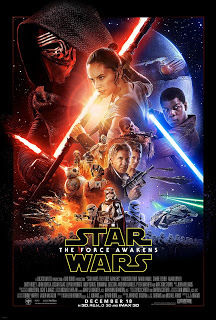 I’ve purposefully held off talking about Star Wars: Episode VII – The Force Awakens (TFA) for a number of reasons, the main one being to allow the hype to die down (and also mainly because I’ve just not had much in the way of time for reviews of any sort until now).
I’ve purposefully held off talking about Star Wars: Episode VII – The Force Awakens (TFA) for a number of reasons, the main one being to allow the hype to die down (and also mainly because I’ve just not had much in the way of time for reviews of any sort until now).
In preparation of this landmark event, myself and a few friends marathoned the preceding Star Wars films so that we’d be ready for TFA. This also resulted in a fair amount of lively discussions as we weighed up the merits and flaws of the various films.
And in that regard, I feel it’s important to view TFA through the lens of the preceding films.
When Episode IV came out all those years ago, George Lucas and his mates didn’t have access to all the neat CGI effects that we take for granted these days. So some of the costumes and creatures are, by today’s standards, a bit corny. (And yes, half the shit Lucas puts in with the rebooted episodes was mostly unnecessary.) Yet it was very much the pulpy, slightly tongue-in-cheek self-aware humour of these early films that makes them stand out for me. They consciously play with the stereotypes and conventions. (Aren't you a little short for a Stormtrooper?)
Though I didn’t see any of the films on the big screen until Episode I, episodes IV, V and VI nevertheless had a huge impact on me at the tender age of 11 when I got to see them on telly. Bad SFX and all. I could suspend disbelief and get carried away by the sheer excitement of what is a classic case of a Chosen One prophecy.
I could segue off on a whole Joseph Campbell Monomyth vibe but I’m not going to because that discussion has been done to death. I use it often enough when running writers’ workshops, as it’s one of the most basic themes in many SFF stories.
I’ve always maintained that the true hero of the entire saga is Anakin Skywalker/Darth Vader – the hero who is only able to bring balance to the known universe once he’s dabbled in the Dark Side. The first six films are all about him. Episode VII in that sense is a fresh start; it’s the Great What Happens After.
Except Episodes I to III fall flat for me not only because of the wooden acting and godawful dialogue, but because they lost the X-factor that made IV to VI awesome. That sense of fun is simply lacking, and we're left with a limping morass of doom and gloom. Which could have been fixed (and this series of posts offer some lovely suggestions).
Yet if we’re looking at cyclical storytelling (which is often inherent in all sagas) then the choices JJ Abrams makes for TFA, are perfectly sensible.
Episodes IV to VI have an energy all of their own. It’s typical farmboy-turns-hero. We are invested in ever-escalating badness. We are introduced to the planet-busting Death Star. A bigger bad behind Darth Vader is introduced, and lastly an even bigger, meaner and downright nastier planet-destroying secret weapon is vaporised. Everyone lives happily ever after. Well, kinda.
Episodes I to III bring nothing new to the table other than backstory, along with annoying amphibious locals in possession of prehensile tongues. We have a showdown between primitive tribes somehow beating a technological superior army. (Moon of Endor, anyone?) We have betrayal. We learn why Anakin went bad (because twu lub, y'know). It can be argued that much of the energy for episodes IV to VI is sorely lacking here, as our anti-hero is revealed as a snotty, whiny brat who pouts and stomps his feet when he doesn’t get his way. Obi Wan, so sagely expressed by Alec Guinness in IV to VI, is portrayed by a sorely ineffectual, under-utilised Ewan McGregor. Natalie Portman’s Padme has a single purpose – to be Luke and Leia’s mum and literally die of a broken heart at the end as a reason for the good guy to go bad. Her passing, of course, just seems like a by-the-by GRRM treatment to get rid of inconvenient characters. Basically, these prequels were three feature-length missed opportunities and pointless staring off into distances with teared-up eyes filled with unjustified emotional wangst.
So yeah, I was filled with trepidation when Episode VII came out. Would they find that fresh current that somehow recaptured what made IV to VI great (for the time in which they were produced)?
My verdict: a resounding yes. I am a huge fan of the Star Wars franchise, despite its many flaws. Episode VII delivered all the excitement and more. Was it a bit too self-referential? I mean, I’ve heard some folks say this is basically A New Hope rebooted. I’ll agree, that there were many moments that echoed the earlier instalments, but I’ll counter by saying that the echoing was necessary to pay homage to the existing canon and to provide a platform for fresh dynamics.
There is a touchstone of familiarity to keep the existing fans happy while not dropping us off the deep end. And oh, the delicious nuance. Kylo Ren has an opportunity to redeem himself, which he rejects. Han Solo makes a stand (and we’ve all seen how he’s been running for years) – and pays the price – but his sacrifice provides a vital pinch point in the plot. We have the call to adventure and the denial of the call (hello, Campbell). We have women plausibly in pivotal roles (thank you). We have diversity that doesn’t feel forced (once again, thank you). Rei, Finn and Damon make a delightful triad easy to love, to temper the rather creepy Kylo Ren. I'm really looking forward to see how they'll develop.
At the appropriate moments, I clung to my seat, shrieked and cried. Abrams certainly knew exactly how to play me.
TFA is a film that was clearly created by a fan of the franchise, for the fans. Is it fresh and original? Objectively, I have to say no. Has it revived the franchise? Yes. But does it entertain? Oh yes. Will I watch it again? Make that a HELL YES.
 I’ve purposefully held off talking about Star Wars: Episode VII – The Force Awakens (TFA) for a number of reasons, the main one being to allow the hype to die down (and also mainly because I’ve just not had much in the way of time for reviews of any sort until now).
I’ve purposefully held off talking about Star Wars: Episode VII – The Force Awakens (TFA) for a number of reasons, the main one being to allow the hype to die down (and also mainly because I’ve just not had much in the way of time for reviews of any sort until now).In preparation of this landmark event, myself and a few friends marathoned the preceding Star Wars films so that we’d be ready for TFA. This also resulted in a fair amount of lively discussions as we weighed up the merits and flaws of the various films.
And in that regard, I feel it’s important to view TFA through the lens of the preceding films.
When Episode IV came out all those years ago, George Lucas and his mates didn’t have access to all the neat CGI effects that we take for granted these days. So some of the costumes and creatures are, by today’s standards, a bit corny. (And yes, half the shit Lucas puts in with the rebooted episodes was mostly unnecessary.) Yet it was very much the pulpy, slightly tongue-in-cheek self-aware humour of these early films that makes them stand out for me. They consciously play with the stereotypes and conventions. (Aren't you a little short for a Stormtrooper?)
Though I didn’t see any of the films on the big screen until Episode I, episodes IV, V and VI nevertheless had a huge impact on me at the tender age of 11 when I got to see them on telly. Bad SFX and all. I could suspend disbelief and get carried away by the sheer excitement of what is a classic case of a Chosen One prophecy.
I could segue off on a whole Joseph Campbell Monomyth vibe but I’m not going to because that discussion has been done to death. I use it often enough when running writers’ workshops, as it’s one of the most basic themes in many SFF stories.
I’ve always maintained that the true hero of the entire saga is Anakin Skywalker/Darth Vader – the hero who is only able to bring balance to the known universe once he’s dabbled in the Dark Side. The first six films are all about him. Episode VII in that sense is a fresh start; it’s the Great What Happens After.
Except Episodes I to III fall flat for me not only because of the wooden acting and godawful dialogue, but because they lost the X-factor that made IV to VI awesome. That sense of fun is simply lacking, and we're left with a limping morass of doom and gloom. Which could have been fixed (and this series of posts offer some lovely suggestions).
Yet if we’re looking at cyclical storytelling (which is often inherent in all sagas) then the choices JJ Abrams makes for TFA, are perfectly sensible.
Episodes IV to VI have an energy all of their own. It’s typical farmboy-turns-hero. We are invested in ever-escalating badness. We are introduced to the planet-busting Death Star. A bigger bad behind Darth Vader is introduced, and lastly an even bigger, meaner and downright nastier planet-destroying secret weapon is vaporised. Everyone lives happily ever after. Well, kinda.
Episodes I to III bring nothing new to the table other than backstory, along with annoying amphibious locals in possession of prehensile tongues. We have a showdown between primitive tribes somehow beating a technological superior army. (Moon of Endor, anyone?) We have betrayal. We learn why Anakin went bad (because twu lub, y'know). It can be argued that much of the energy for episodes IV to VI is sorely lacking here, as our anti-hero is revealed as a snotty, whiny brat who pouts and stomps his feet when he doesn’t get his way. Obi Wan, so sagely expressed by Alec Guinness in IV to VI, is portrayed by a sorely ineffectual, under-utilised Ewan McGregor. Natalie Portman’s Padme has a single purpose – to be Luke and Leia’s mum and literally die of a broken heart at the end as a reason for the good guy to go bad. Her passing, of course, just seems like a by-the-by GRRM treatment to get rid of inconvenient characters. Basically, these prequels were three feature-length missed opportunities and pointless staring off into distances with teared-up eyes filled with unjustified emotional wangst.
So yeah, I was filled with trepidation when Episode VII came out. Would they find that fresh current that somehow recaptured what made IV to VI great (for the time in which they were produced)?
My verdict: a resounding yes. I am a huge fan of the Star Wars franchise, despite its many flaws. Episode VII delivered all the excitement and more. Was it a bit too self-referential? I mean, I’ve heard some folks say this is basically A New Hope rebooted. I’ll agree, that there were many moments that echoed the earlier instalments, but I’ll counter by saying that the echoing was necessary to pay homage to the existing canon and to provide a platform for fresh dynamics.
There is a touchstone of familiarity to keep the existing fans happy while not dropping us off the deep end. And oh, the delicious nuance. Kylo Ren has an opportunity to redeem himself, which he rejects. Han Solo makes a stand (and we’ve all seen how he’s been running for years) – and pays the price – but his sacrifice provides a vital pinch point in the plot. We have the call to adventure and the denial of the call (hello, Campbell). We have women plausibly in pivotal roles (thank you). We have diversity that doesn’t feel forced (once again, thank you). Rei, Finn and Damon make a delightful triad easy to love, to temper the rather creepy Kylo Ren. I'm really looking forward to see how they'll develop.
At the appropriate moments, I clung to my seat, shrieked and cried. Abrams certainly knew exactly how to play me.
TFA is a film that was clearly created by a fan of the franchise, for the fans. Is it fresh and original? Objectively, I have to say no. Has it revived the franchise? Yes. But does it entertain? Oh yes. Will I watch it again? Make that a HELL YES.
Published on March 27, 2016 07:53
Avatar (2009) #review
When his brother is killed in a robbery, paraplegic Marine Jake Sully decides to take his place in a mission on the distant world of Pandora.
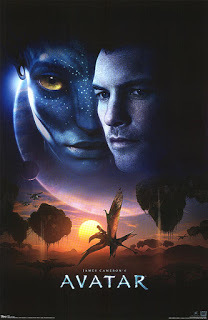 It took me a very long time to get round to watching Avatar. Mainly it was the case of the film having way too much hype at the time of its release. Also, at the time, I’d had a lot of other things on my mind and going to the movies had been the least of my concerns.
It took me a very long time to get round to watching Avatar. Mainly it was the case of the film having way too much hype at the time of its release. Also, at the time, I’d had a lot of other things on my mind and going to the movies had been the least of my concerns.
By the time the film came out on DVD, it was a case of not being able to convince my SO that we should watch it. So yes, ever since 2009, right up until early 2016, I successfully avoided watching the film about the blue slightly feline alien people who hug trees.
I’m also aware, on the periphery, that there was a lot of bitching and moaning from various communities about stereotypes – especially the idea of the “noble savage” vs. “evil, greedy capitalist scumdogs with big guns”.
Did James Cameron have an agenda when he created this film? I suspect he did, even if he didn’t quite admit it to himself. Or even if he did, does it really matter? There’s a more than heavy-handed environmental message here to bash viewers upside the head. And yeah, some of the dialogue is a bit “Well, as you know, Doctor Bob, the unobtainium…”
Unobtanium. I mean, really? [Falls over. Dies laughing]
But then again, attempting nuanced dialogue in big-budget films when you’re aiming for a broad audience isn’t always possible. I guess. And knowing what I do about behind the scenes of big-budget films … things can be hairy. Sometimes simple is best.
But …
But …
What I can’t deny is that Avatar is a pretty film. A very, very pretty film. I’m almost sorry I didn’t get to see it on the big screen because the CGI, even years on from its release is still jaw-droppingly amazeballs. And the James Horner OST, though a bit schmaltzy, is pure loveliness. I am still listening to it on Apple Music.
Essentially, as I’ve read before, Avatar is Dances with Wolves on a moon with blue cat people instead of the First People. Privileged white boy somehow immerses himself into alien culture and succeeds in becoming their Chosen One. It’s pure, Marty Stu wish fulfilment in all its inglorious ridiculousness.
SJWs and the rest of the Regressive Left probably have a million reasons why this film franchise is harmful to XYZ and that James Cameron is a Very Bad Person.
If you’re looking for depth of character, grey areas, and a nuanced plot, then this is not your film. If, however, you just want to hold onto the ikran and let go to fall through the verdant rainforest, and discover a fantastically rendered world filled with dangerous beasts and insane vegetation, this is a lush, gorgeous film. And kudos to all the creatives behind the scenes in production and art department. You guys are amazing, and your work is beautiful. Also, any film featuring Sigourney Weaver rocks.
 It took me a very long time to get round to watching Avatar. Mainly it was the case of the film having way too much hype at the time of its release. Also, at the time, I’d had a lot of other things on my mind and going to the movies had been the least of my concerns.
It took me a very long time to get round to watching Avatar. Mainly it was the case of the film having way too much hype at the time of its release. Also, at the time, I’d had a lot of other things on my mind and going to the movies had been the least of my concerns.By the time the film came out on DVD, it was a case of not being able to convince my SO that we should watch it. So yes, ever since 2009, right up until early 2016, I successfully avoided watching the film about the blue slightly feline alien people who hug trees.
I’m also aware, on the periphery, that there was a lot of bitching and moaning from various communities about stereotypes – especially the idea of the “noble savage” vs. “evil, greedy capitalist scumdogs with big guns”.
Did James Cameron have an agenda when he created this film? I suspect he did, even if he didn’t quite admit it to himself. Or even if he did, does it really matter? There’s a more than heavy-handed environmental message here to bash viewers upside the head. And yeah, some of the dialogue is a bit “Well, as you know, Doctor Bob, the unobtainium…”
Unobtanium. I mean, really? [Falls over. Dies laughing]
But then again, attempting nuanced dialogue in big-budget films when you’re aiming for a broad audience isn’t always possible. I guess. And knowing what I do about behind the scenes of big-budget films … things can be hairy. Sometimes simple is best.
But …
But …
What I can’t deny is that Avatar is a pretty film. A very, very pretty film. I’m almost sorry I didn’t get to see it on the big screen because the CGI, even years on from its release is still jaw-droppingly amazeballs. And the James Horner OST, though a bit schmaltzy, is pure loveliness. I am still listening to it on Apple Music.
Essentially, as I’ve read before, Avatar is Dances with Wolves on a moon with blue cat people instead of the First People. Privileged white boy somehow immerses himself into alien culture and succeeds in becoming their Chosen One. It’s pure, Marty Stu wish fulfilment in all its inglorious ridiculousness.
SJWs and the rest of the Regressive Left probably have a million reasons why this film franchise is harmful to XYZ and that James Cameron is a Very Bad Person.
If you’re looking for depth of character, grey areas, and a nuanced plot, then this is not your film. If, however, you just want to hold onto the ikran and let go to fall through the verdant rainforest, and discover a fantastically rendered world filled with dangerous beasts and insane vegetation, this is a lush, gorgeous film. And kudos to all the creatives behind the scenes in production and art department. You guys are amazing, and your work is beautiful. Also, any film featuring Sigourney Weaver rocks.
Published on March 27, 2016 03:06
February 13, 2016
Dragon Age: The World of Thedas Volume 1 #review
Title:
Dragon Age: The World of Thedas Volume 1
Introductions by Mike Laidlaw and David Gaider
Publisher: Dark Horse Books, 2013
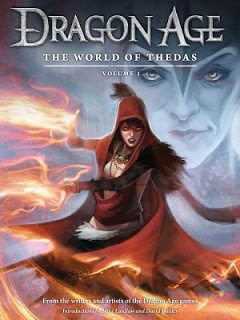 Every once in a while there’s a book I simply must have a physical copy of in the house, and this is one of them. Hardcover, full colour printing throughout and devastatingly beautiful art – enough to make me want to purr, caress its cover and breathe sweet nothings into its pages.
Every once in a while there’s a book I simply must have a physical copy of in the house, and this is one of them. Hardcover, full colour printing throughout and devastatingly beautiful art – enough to make me want to purr, caress its cover and breathe sweet nothings into its pages.
This is one for the fans of BioWare’s Dragon Age game franchise, and it’s well worth the clams forked out and the effort of importing. (And rushing down to the postbox every time the postman whizzes by on his bicycle.)
{And yes, I’m still smarting from the import duties SARS gifted me with for the privilege of buying this book.}
What’s clear from the three games brought out so far is that the fantasy world of Thedas is chock full of lore – so much so that I’d hazard to say that given a few years the peeps at BioWare are going to give Tolkien a run for his money. As it is, they’re snapping at his heels.
Volume 1 pretty much reads like a traveller’s guide to Thedas, not only giving a timeline for events – starting with the rise and fall of the elves’ Arlathan, to the expansion of the sprawling Tevinter Empire and the subsequent blights, but also giving an overview of the races, nations, magic, religion, the fade, the blight and assorted wildlife. This volume is by no means exhaustive, but serves as a good introduction to the setting without giving away too many spoilers for those who’ve yet to play the games.
Even my husband – who’s patiently still waiting for me to get over my fascination with the game – had to admit that the book’s layout and art are pretty darn impressive. This is a pretty book – there’s no denying that. It will cause the fans to make grabby fingers. It’s also useful as reference for those who’re addicted to unpicking canon and who may wish to create fanfiction. And volume 2 arrived recently in the mail too. Like my centenary edition of Tolkien’s The Lord of the Rings that also graces my permanent book collection, this one’s a keeper.
As a storyteller, I’m envious of those writers who’ve had the chance to contribute to the creation of this world, and as the map suggests, the games, books and comics have only scratched the surface of all the possible future tales yet to be told. Yes, this is standard high fantasy involving elves, dragons, mages and brave warriors, but it’s what the content creators say with these stories and their art that is important – touching on many important issues. The world of Thedas matters, because in many ways those existing, familiar tropes resonate on a deeper level. The fact that so many of the heroes are tragic, and are faced with impossible choices that turn out badly no matter what, attests to the fact that the BioWare writers are basically horrible, evil people who love to torment gamers. But we love them anyway and keep returning for second helpings. And the great thing about the games is that for a while we can tune out the real world where we have little agency, and plunge ourselves into a world where we are the heroes who can and do make a difference.
Introductions by Mike Laidlaw and David Gaider
Publisher: Dark Horse Books, 2013
 Every once in a while there’s a book I simply must have a physical copy of in the house, and this is one of them. Hardcover, full colour printing throughout and devastatingly beautiful art – enough to make me want to purr, caress its cover and breathe sweet nothings into its pages.
Every once in a while there’s a book I simply must have a physical copy of in the house, and this is one of them. Hardcover, full colour printing throughout and devastatingly beautiful art – enough to make me want to purr, caress its cover and breathe sweet nothings into its pages.This is one for the fans of BioWare’s Dragon Age game franchise, and it’s well worth the clams forked out and the effort of importing. (And rushing down to the postbox every time the postman whizzes by on his bicycle.)
{And yes, I’m still smarting from the import duties SARS gifted me with for the privilege of buying this book.}
What’s clear from the three games brought out so far is that the fantasy world of Thedas is chock full of lore – so much so that I’d hazard to say that given a few years the peeps at BioWare are going to give Tolkien a run for his money. As it is, they’re snapping at his heels.
Volume 1 pretty much reads like a traveller’s guide to Thedas, not only giving a timeline for events – starting with the rise and fall of the elves’ Arlathan, to the expansion of the sprawling Tevinter Empire and the subsequent blights, but also giving an overview of the races, nations, magic, religion, the fade, the blight and assorted wildlife. This volume is by no means exhaustive, but serves as a good introduction to the setting without giving away too many spoilers for those who’ve yet to play the games.
Even my husband – who’s patiently still waiting for me to get over my fascination with the game – had to admit that the book’s layout and art are pretty darn impressive. This is a pretty book – there’s no denying that. It will cause the fans to make grabby fingers. It’s also useful as reference for those who’re addicted to unpicking canon and who may wish to create fanfiction. And volume 2 arrived recently in the mail too. Like my centenary edition of Tolkien’s The Lord of the Rings that also graces my permanent book collection, this one’s a keeper.
As a storyteller, I’m envious of those writers who’ve had the chance to contribute to the creation of this world, and as the map suggests, the games, books and comics have only scratched the surface of all the possible future tales yet to be told. Yes, this is standard high fantasy involving elves, dragons, mages and brave warriors, but it’s what the content creators say with these stories and their art that is important – touching on many important issues. The world of Thedas matters, because in many ways those existing, familiar tropes resonate on a deeper level. The fact that so many of the heroes are tragic, and are faced with impossible choices that turn out badly no matter what, attests to the fact that the BioWare writers are basically horrible, evil people who love to torment gamers. But we love them anyway and keep returning for second helpings. And the great thing about the games is that for a while we can tune out the real world where we have little agency, and plunge ourselves into a world where we are the heroes who can and do make a difference.
Published on February 13, 2016 06:49
February 11, 2016
Bloody Parchment's Icy Sedgwick
Today another Bloody Parchment veteran, Icy Sedgwick, stops by to chat a little more about herself and her writing. Welcome, Icy!
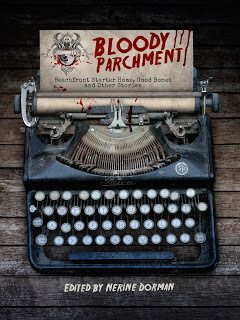 Tell us a little bit about yourself.
Tell us a little bit about yourself.
I'm a Geordie born and bred, and I live and work in Newcastle. By day I teach graphic design, and by night I'm either working on fiction, or working on my PhD, which looks at set design in contemporary haunted house films. If I'm not doing that I'm knitting or crocheting. People laugh at me but hey, can their hobbies turn string into clothing using just two sticks?
What gives in your story?
I've got a lifelong fascination with mummies, and I wanted an excuse to work one into a story! I'd had the title in mind for ages, and I never really knew what to do with it, so I just sat down and started writing. It ended up turning into a story about an evacuee, sent to an isolated country house (because it has to be isolated, or it's not Gothic) to stay with her aunt, but all is not as it seems, especially since she's acquired a mummy in a case, and something keeps talking to her when it's quiet...
What do you love about reading and writing speculative fiction?
I love the ease with which you can just dive into the unknown. It's the 'what if?' nature of speculative fiction. But then it's not just plot-driven, or escapist - speculative fiction can deal with huge themes and really important issues, but it does so in such a way that you actually find yourself invested in them, while more literary forms can sometimes make you feel patronised or preached at.
Is there a novel or movie that you feel has been the most influential on you, that you keep coming back to?
I can't think of a specific singular book or film, it's more been about genres or authors, but I do think Neverwhere would be an influence. I love the way Neil Gaiman used real parts of London, and I won't lie, I did used to hope I'd stumble across the entrance to London Below when I lived in the capital. As far as I know, I never did.
How do you approach the writing process?
From an angle ;-) In all seriousness, I try to approach it with a sense of whimsy because when you look at it, the whole process is slightly silly. You're essentially making things up - there are few other times in life with doing that is acceptable, unless you're a politician. So I have my idea, which either comes from something I've (often) misheard, or a 'what if?', and then it's a question of following the rabbit hole to see how far it goes.
LINKS
Blog, Facebook, Twitter, Instagram, The Guns of Retribution, The Necromancer's Apprentice.
 Tell us a little bit about yourself.
Tell us a little bit about yourself.I'm a Geordie born and bred, and I live and work in Newcastle. By day I teach graphic design, and by night I'm either working on fiction, or working on my PhD, which looks at set design in contemporary haunted house films. If I'm not doing that I'm knitting or crocheting. People laugh at me but hey, can their hobbies turn string into clothing using just two sticks?
What gives in your story?
I've got a lifelong fascination with mummies, and I wanted an excuse to work one into a story! I'd had the title in mind for ages, and I never really knew what to do with it, so I just sat down and started writing. It ended up turning into a story about an evacuee, sent to an isolated country house (because it has to be isolated, or it's not Gothic) to stay with her aunt, but all is not as it seems, especially since she's acquired a mummy in a case, and something keeps talking to her when it's quiet...
What do you love about reading and writing speculative fiction?
I love the ease with which you can just dive into the unknown. It's the 'what if?' nature of speculative fiction. But then it's not just plot-driven, or escapist - speculative fiction can deal with huge themes and really important issues, but it does so in such a way that you actually find yourself invested in them, while more literary forms can sometimes make you feel patronised or preached at.
Is there a novel or movie that you feel has been the most influential on you, that you keep coming back to?
I can't think of a specific singular book or film, it's more been about genres or authors, but I do think Neverwhere would be an influence. I love the way Neil Gaiman used real parts of London, and I won't lie, I did used to hope I'd stumble across the entrance to London Below when I lived in the capital. As far as I know, I never did.
How do you approach the writing process?
From an angle ;-) In all seriousness, I try to approach it with a sense of whimsy because when you look at it, the whole process is slightly silly. You're essentially making things up - there are few other times in life with doing that is acceptable, unless you're a politician. So I have my idea, which either comes from something I've (often) misheard, or a 'what if?', and then it's a question of following the rabbit hole to see how far it goes.
LINKS
Blog, Facebook, Twitter, Instagram, The Guns of Retribution, The Necromancer's Apprentice.
Published on February 11, 2016 12:20
February 9, 2016
Bloody Parchment's Chris Limb #interview
The SA HorrorFest Bloody Parchment anthologies have a few veterans who've appeared among the finalists regularly, and one of these is Chris Limb, who needs very little by way of introduction here on my blog. His tale appears in the most recent Bloody Parchment anthology: Beachfront Start Home, Good Bones and Other Stories, and without any further ado, I hand over my blog to him.
Welcome, Chris, and for those readers who haven't met you before, tell us a little bit about yourself.
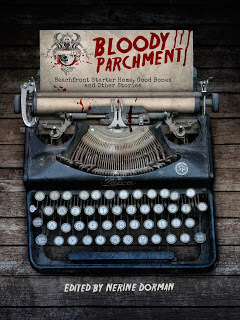 I live by the sea in the UK. I left my day job and have been working as a freelance web developer and graphic designer for the past year or so which has been simultaneously liberating and isolating. Luckily I have my twin passions of writing and music to keep me busy and entertained.
I live by the sea in the UK. I left my day job and have been working as a freelance web developer and graphic designer for the past year or so which has been simultaneously liberating and isolating. Luckily I have my twin passions of writing and music to keep me busy and entertained.
I'm the bass player in a band called Das Flüff who play "sexistential electro post-punk twisted disco cyber filth"! The only thing better than going to a gig is playing one, although I still love both.
I've been writing on a more regular basis since 2007 but my first break came when my story Alibi was published in the Bloody Parchment 2012 anthology. Since then I've had a few more stories published in anthologies and online magazines.
I also have two complete novels I am continuing to try and find homes for...
What gives in your story?
I am a social media junkie and find the way it all works and add an extra dimension to human existence fascinating. Twitter is my medium of choice so I suppose it was only a matter of time before I decided to explore it in fiction.
The seed of the story itself came from an article I read on cyber-bullying the details of which I won't share here for fear of spoiling the story. I was also inspired by the discovery of a Twitter account that I imagined looked as if it had been set up just to follow me. Just like the account in the story, it followed me plus a selection of celebrities and information services. Plus one other account I suspected of being the primary account of the person who had set it up. Its timeline consisted entirely of retweets.
All in all it was a very strange set-up. Why not just follow me from the primary account? Twitter is by its very nature a bit stalkery.
In reality I was probably imagining the more sinister implications and it was all a coincidence. The human brain is very good at looking for patterns and worrying about any potential danger they may present.
Either way, the idea for the story came to me fairly quickly after that.
Why do you love about reading and writing speculative fiction?
I love the sense that anything can happen. Things can genuinely surprise the reader because normal rules don't apply. I love the "what-if" of speculative fiction, stepping outside the mundane.
As I get older it seems as if the world is becoming increasingly unimaginative in what is permitted. Reality is being reduced to the lowest common denominator. For example, back in the early nineties I was certain that by 2016 space travel would be commonplace, that we'd have already established a Moon base and have landed on Mars. Instead these fantastical dreams are retreating before us like desert mirages.
When I was growing up there were often documentaries on TV about the paranormal and the strange; as a child these indicated to me that the world could be exciting and unknown. Now the discussion of such things in the respectable media is almost taboo.
For me, writing and reading speculative fiction captures the excitement of when the world was a more interesting place full of potential and mystery. A way of returning to youth, however temporarily.
Is there a novel or movie that you feel has been the most influential on you, that you keep coming back to?
I can't think of any one novel or movie that looms large enough to say is the most influential.
However, there are a number of writers I really enjoy and find inspiring in that after I finish reading one of their novels I want to write something of my own.
Michael Marshall Smith is one of them – when I read his first novel I was astonished that there was someone out there who seemed to be writing in what up until that point I had assumed was my own inner voice...
William Gibson is another. He seems to be able to get ideas and emotions across with a surprising economy of words. Mona Lisa Overdrive is one of my favourite novels and yet despite its scope and how embedded its world I felt, it's only just over 80 000 words long.
In general though I find discovering new novels more exciting and inspiring than revisiting old favourites - over the past couple of years I have enjoyed and been inspired by novels by Claire North, Ramez Naam, Emmi Itäranta, Sarah Pinborough and Ben Aaronovitch.
How do you approach the writing process?
With short stories what tends to happen is that I will get the germ of an idea that I will make a note of on my phone (it's usually when I am out and about). Occasionally these are a bit too cryptic and I forget what the idea was!
Part of my daily routine for the past six years has been writing every morning using the online service at 750 Words. If one of the story ideas I've made a note of is nagging at me I will start it during this session and then keep writing approximately seven hundred and fifty words or more a day until a very rough draft is finished.
I then leave it a few days and go back and start severely editing it. After a while - and often it can now be half the length of the rough draft - I am satisfied and so I look for somewhere to submit it on Duotrope. With the last novel it was more or less the same process but much longer; a case of keeping going until I'd finished and only then going back and editing it.
Links/URLs
Web page, Das Fluff, Twitter, International kindle links for non fiction 80s pop memoir.
Welcome, Chris, and for those readers who haven't met you before, tell us a little bit about yourself.
 I live by the sea in the UK. I left my day job and have been working as a freelance web developer and graphic designer for the past year or so which has been simultaneously liberating and isolating. Luckily I have my twin passions of writing and music to keep me busy and entertained.
I live by the sea in the UK. I left my day job and have been working as a freelance web developer and graphic designer for the past year or so which has been simultaneously liberating and isolating. Luckily I have my twin passions of writing and music to keep me busy and entertained.I'm the bass player in a band called Das Flüff who play "sexistential electro post-punk twisted disco cyber filth"! The only thing better than going to a gig is playing one, although I still love both.
I've been writing on a more regular basis since 2007 but my first break came when my story Alibi was published in the Bloody Parchment 2012 anthology. Since then I've had a few more stories published in anthologies and online magazines.
I also have two complete novels I am continuing to try and find homes for...
What gives in your story?
I am a social media junkie and find the way it all works and add an extra dimension to human existence fascinating. Twitter is my medium of choice so I suppose it was only a matter of time before I decided to explore it in fiction.
The seed of the story itself came from an article I read on cyber-bullying the details of which I won't share here for fear of spoiling the story. I was also inspired by the discovery of a Twitter account that I imagined looked as if it had been set up just to follow me. Just like the account in the story, it followed me plus a selection of celebrities and information services. Plus one other account I suspected of being the primary account of the person who had set it up. Its timeline consisted entirely of retweets.
All in all it was a very strange set-up. Why not just follow me from the primary account? Twitter is by its very nature a bit stalkery.
In reality I was probably imagining the more sinister implications and it was all a coincidence. The human brain is very good at looking for patterns and worrying about any potential danger they may present.
Either way, the idea for the story came to me fairly quickly after that.
Why do you love about reading and writing speculative fiction?
I love the sense that anything can happen. Things can genuinely surprise the reader because normal rules don't apply. I love the "what-if" of speculative fiction, stepping outside the mundane.
As I get older it seems as if the world is becoming increasingly unimaginative in what is permitted. Reality is being reduced to the lowest common denominator. For example, back in the early nineties I was certain that by 2016 space travel would be commonplace, that we'd have already established a Moon base and have landed on Mars. Instead these fantastical dreams are retreating before us like desert mirages.
When I was growing up there were often documentaries on TV about the paranormal and the strange; as a child these indicated to me that the world could be exciting and unknown. Now the discussion of such things in the respectable media is almost taboo.
For me, writing and reading speculative fiction captures the excitement of when the world was a more interesting place full of potential and mystery. A way of returning to youth, however temporarily.
Is there a novel or movie that you feel has been the most influential on you, that you keep coming back to?
I can't think of any one novel or movie that looms large enough to say is the most influential.
However, there are a number of writers I really enjoy and find inspiring in that after I finish reading one of their novels I want to write something of my own.
Michael Marshall Smith is one of them – when I read his first novel I was astonished that there was someone out there who seemed to be writing in what up until that point I had assumed was my own inner voice...
William Gibson is another. He seems to be able to get ideas and emotions across with a surprising economy of words. Mona Lisa Overdrive is one of my favourite novels and yet despite its scope and how embedded its world I felt, it's only just over 80 000 words long.
In general though I find discovering new novels more exciting and inspiring than revisiting old favourites - over the past couple of years I have enjoyed and been inspired by novels by Claire North, Ramez Naam, Emmi Itäranta, Sarah Pinborough and Ben Aaronovitch.
How do you approach the writing process?
With short stories what tends to happen is that I will get the germ of an idea that I will make a note of on my phone (it's usually when I am out and about). Occasionally these are a bit too cryptic and I forget what the idea was!
Part of my daily routine for the past six years has been writing every morning using the online service at 750 Words. If one of the story ideas I've made a note of is nagging at me I will start it during this session and then keep writing approximately seven hundred and fifty words or more a day until a very rough draft is finished.
I then leave it a few days and go back and start severely editing it. After a while - and often it can now be half the length of the rough draft - I am satisfied and so I look for somewhere to submit it on Duotrope. With the last novel it was more or less the same process but much longer; a case of keeping going until I'd finished and only then going back and editing it.
Links/URLs
Web page, Das Fluff, Twitter, International kindle links for non fiction 80s pop memoir.
Published on February 09, 2016 12:32
February 6, 2016
Technological Determinism (basically a bunch of academic waffle so skip this if it bores you)
Basically, what's going to follow here is a bunch of semi-masticated academic musings, so bear with me if this topic interests you. Feel free to jump in with waffle of your own in the comments section. Shoot my thoughts down in flame if need be. The point is to think about whether technology determines the nature of mass communication (as per my media studies this semester). Basically, what the fat green textbook (Media Studies: Media History, Media and Society edited by Pieter J Fourie) tells us is that technological determinism is the belief that technology drives social change, culture, economics and politics.
 Media is a core function of society, especially if we look at *how* exactly we've shared information throughout the ages. We've gone from verbal/oral cultural tradition, to mixing pigments and smearing them on rock ... or even carving little pictograms of animals. And we've progressed to making sculptures on rock or writing on paper, to make a more binding mark. Mostly, our ways of employing media, initially by a select few who were educated (priests, scribes, merchants) had the power to tell their particular stories or share their versions of events, and lay them down for future generations.
Media is a core function of society, especially if we look at *how* exactly we've shared information throughout the ages. We've gone from verbal/oral cultural tradition, to mixing pigments and smearing them on rock ... or even carving little pictograms of animals. And we've progressed to making sculptures on rock or writing on paper, to make a more binding mark. Mostly, our ways of employing media, initially by a select few who were educated (priests, scribes, merchants) had the power to tell their particular stories or share their versions of events, and lay them down for future generations.
We cannot remember everything that we discuss, so it makes sense to somehow find a way to record it, and the next step is naturally how we disseminate this information. Libraries, in old times, were the vast repositories of knowledge, the stacks haunted by librarians and scribes with the specialised skills and training to discern which knowledge is useful and to share it with those who have the privilege to enter those hallowed halls.
Schools, universities and other centres of learning have had, historically, an degree of exclusivity in many cases. Even today, many do not have the benefit of decent education, but our access to knowledge isn't curtailed as it was before.
Radio, TV, film ... these are all ways in which a select group of communicators can reach out to many hundreds of thousands of people who are now consumers of media.
Ever sat around at a table where a bunch of folks have all seen a movie? (Here's a somewhat silly example – you either like Star Wars, or you don't, and this immediately divides people into two camps, perhaps even somewhat vocally.) But I'm sure you get my picture.
Yet there's still a degree of exclusivity – you have a film production company or broadcaster who has a particular set of values, that they communicate. They have a vetting process, with the power to decide which information they're going to share. What is news? What is important? What do they feel people should know?
We've had, in the past, the written word to bind, to be contractual. Now we've got "I saw it on TV" which offers visual and aural aspects to make things real, to solidify events in people's minds. This is the story. This is the preferred narrative. A skilled editor understands the power of shaping people's emotions and thoughts by choosing which narrative to portray. What is the underlining meaning?
Yet media have changed yet again during the past decade – dramatically so with the rise of social networks and the near-instantaneous communication. News breaks online as fast as people can type or share videos of images. These can be shared by the simple touch of a button. It's now not so much a fact of jealously hoarded and carefully disseminated information, but rather how we wade through and choose *which* information we'll take in.
We are drowning in news feeds. We also now, more than ever before, have the power to create our personal echo chamber to cut out the noise we don't want. How do we know which stories to put stock in? Without a (yes, ultimately biased) vetting process, how does one discern bullshit from authentic value?
There are definite benefits to this shrinking of communication – the fact that geological separation at the end of the day really doesn't matter, not when we are a Skype call away or can email a letter in the space of half a minute and know the recipient will have it appear in their inbox a minute later, if not sooner.
We can access the greatest libraries in the world that have no physical shelves in the space of minutes. We can share their information. The real mad skills we need now is deciding which information we're going to use. It's not so much how much knowledge we have, but how and when we choose to access it. The rule book for social interaction has changed as we document our lives in minute detail. The emphasis is on the individual, and perhaps best expressed in the odious notion of leaving our hashtagged #selfie – our own stab at immortality perhaps in an ephemeral world. To close, we have the power at our own fingertips; we are our own gatekeepers, and notions of privacy have shifted dramatically. You are not as alone as you sometimes think you feel.
I'd love to hear your thoughts.
 Media is a core function of society, especially if we look at *how* exactly we've shared information throughout the ages. We've gone from verbal/oral cultural tradition, to mixing pigments and smearing them on rock ... or even carving little pictograms of animals. And we've progressed to making sculptures on rock or writing on paper, to make a more binding mark. Mostly, our ways of employing media, initially by a select few who were educated (priests, scribes, merchants) had the power to tell their particular stories or share their versions of events, and lay them down for future generations.
Media is a core function of society, especially if we look at *how* exactly we've shared information throughout the ages. We've gone from verbal/oral cultural tradition, to mixing pigments and smearing them on rock ... or even carving little pictograms of animals. And we've progressed to making sculptures on rock or writing on paper, to make a more binding mark. Mostly, our ways of employing media, initially by a select few who were educated (priests, scribes, merchants) had the power to tell their particular stories or share their versions of events, and lay them down for future generations.We cannot remember everything that we discuss, so it makes sense to somehow find a way to record it, and the next step is naturally how we disseminate this information. Libraries, in old times, were the vast repositories of knowledge, the stacks haunted by librarians and scribes with the specialised skills and training to discern which knowledge is useful and to share it with those who have the privilege to enter those hallowed halls.
Schools, universities and other centres of learning have had, historically, an degree of exclusivity in many cases. Even today, many do not have the benefit of decent education, but our access to knowledge isn't curtailed as it was before.
Radio, TV, film ... these are all ways in which a select group of communicators can reach out to many hundreds of thousands of people who are now consumers of media.
Ever sat around at a table where a bunch of folks have all seen a movie? (Here's a somewhat silly example – you either like Star Wars, or you don't, and this immediately divides people into two camps, perhaps even somewhat vocally.) But I'm sure you get my picture.
Yet there's still a degree of exclusivity – you have a film production company or broadcaster who has a particular set of values, that they communicate. They have a vetting process, with the power to decide which information they're going to share. What is news? What is important? What do they feel people should know?
We've had, in the past, the written word to bind, to be contractual. Now we've got "I saw it on TV" which offers visual and aural aspects to make things real, to solidify events in people's minds. This is the story. This is the preferred narrative. A skilled editor understands the power of shaping people's emotions and thoughts by choosing which narrative to portray. What is the underlining meaning?
Yet media have changed yet again during the past decade – dramatically so with the rise of social networks and the near-instantaneous communication. News breaks online as fast as people can type or share videos of images. These can be shared by the simple touch of a button. It's now not so much a fact of jealously hoarded and carefully disseminated information, but rather how we wade through and choose *which* information we'll take in.
We are drowning in news feeds. We also now, more than ever before, have the power to create our personal echo chamber to cut out the noise we don't want. How do we know which stories to put stock in? Without a (yes, ultimately biased) vetting process, how does one discern bullshit from authentic value?
There are definite benefits to this shrinking of communication – the fact that geological separation at the end of the day really doesn't matter, not when we are a Skype call away or can email a letter in the space of half a minute and know the recipient will have it appear in their inbox a minute later, if not sooner.
We can access the greatest libraries in the world that have no physical shelves in the space of minutes. We can share their information. The real mad skills we need now is deciding which information we're going to use. It's not so much how much knowledge we have, but how and when we choose to access it. The rule book for social interaction has changed as we document our lives in minute detail. The emphasis is on the individual, and perhaps best expressed in the odious notion of leaving our hashtagged #selfie – our own stab at immortality perhaps in an ephemeral world. To close, we have the power at our own fingertips; we are our own gatekeepers, and notions of privacy have shifted dramatically. You are not as alone as you sometimes think you feel.
I'd love to hear your thoughts.
Published on February 06, 2016 11:24
January 25, 2016
Ten of the Best – Top Reads for 2015
I’m a bit late with my “best of” reading list for 2015, but hey, it’s better late than never. Sadly I don’t get as much time to read as I used to before I went freelance, but then some things can’t be helped. What you’ll get here is a mix of books that are both old and new, because I’m a firm believer that we *do* need talk about older titles. So, here, in alphabetical order, are my top ten reads for the year, accompanied by extracts from my reviews, many of which appeared in the Pretoria News and on my blog.
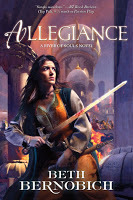 Allegiance
by Beth Bernobich hit all the marks for me with a well-defined, diverse cast. This the third of her River of Souls fantasy trilogy filled with intrigue, magic and adventure. More than that I won't say. Ilse and Raul are most certainly unforgettable, and if you're looking for a richly textured, gradually unfolding saga, then this is the sort of tale that harks back to the classics.
Allegiance
by Beth Bernobich hit all the marks for me with a well-defined, diverse cast. This the third of her River of Souls fantasy trilogy filled with intrigue, magic and adventure. More than that I won't say. Ilse and Raul are most certainly unforgettable, and if you're looking for a richly textured, gradually unfolding saga, then this is the sort of tale that harks back to the classics.
Not only am I drawn to her writing because of her solid worldbuilding, but also because she has created a society where there is less division between the roles played by men and women, and also a fluidity of sexuality. Women are soldiers, they can take on positions of power, and it doesn’t matter who you love. What else I adored was the fact that Bernobich breaks away from the Eurocentricism still prevalent in contemporary fantasy, to gift us with a saga that is distinctly Eastern in flavour without being heavy handed. – an extract from my review.
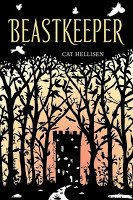 Beastkeeper
by Cat Hellisen is another story that gave me the shivers. Cat has been one of my guiding lights and her writing is lush, nuanced and immersive. In Beastkeeper she retells "Beauty and the Beast", but from the point of Sarah, a lonely child whose parents have separated. She is sent to live with her remote grandmother, and discovers that her family harbours many secrets.
Beastkeeper
by Cat Hellisen is another story that gave me the shivers. Cat has been one of my guiding lights and her writing is lush, nuanced and immersive. In Beastkeeper she retells "Beauty and the Beast", but from the point of Sarah, a lonely child whose parents have separated. She is sent to live with her remote grandmother, and discovers that her family harbours many secrets.
As always, Hellisen seems to effortlessly touch on the universality of fairy tales to delve even deeper and bring up underlying themes. One one level, this is a children’s quest to break a curse. On another, it’s a parable of how twisted love has soured to hate and indifference, and how one young person can find it in herself to step outside the trap of a destructive cycle. This is a dark, painful and elegant tale, made all the more beautiful, because Hellisen weaves with mystery and doesn’t hand over all the answers on a plate.
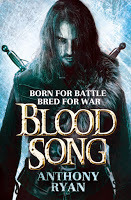 Blood Song
by Anthony Ryan is book one of his Raven's Shadow trilogy, and has been one of my new discoveries in fantasy, and I've been gushing like a complete fangrrrl to anyone who's been within earshot. Anthony is an example of where self-publishing can lead to greater things, and this is coming-of-age story turns into a military fantasy that rubs shoulders with a fair amount of adventure and derring-do.
Blood Song
by Anthony Ryan is book one of his Raven's Shadow trilogy, and has been one of my new discoveries in fantasy, and I've been gushing like a complete fangrrrl to anyone who's been within earshot. Anthony is an example of where self-publishing can lead to greater things, and this is coming-of-age story turns into a military fantasy that rubs shoulders with a fair amount of adventure and derring-do.
Ryan is relentless in what he has his characters endure, and the results are hardly convenient or tidy (as one can expect in an authentic setting). Expect bloodshed, violence and much death. Vaelin is a complex character whose actions aren’t always kind, but he is consistent in his logic, and I couldn’t help but admire him, even if I did not always agree with his decisions.
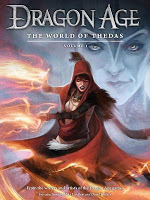 Dragon Age: The World of Thedas Volume 1
by David Gaider, Ben Gelinas, Mike Laidlaw and Dave Marshall (editor) was oh so worth the effort of giving my money to BioWare (as I seem to be wont to do of late). I'm a huge fan of the game, not only because it's what I term as a fantasy RPG for Generation X, but because hells, the lore. So. Much. Lore. I'm a lore junkie. Also, this is just a really, really pretty book. And I'm unashamedly a fangrrrl.
Dragon Age: The World of Thedas Volume 1
by David Gaider, Ben Gelinas, Mike Laidlaw and Dave Marshall (editor) was oh so worth the effort of giving my money to BioWare (as I seem to be wont to do of late). I'm a huge fan of the game, not only because it's what I term as a fantasy RPG for Generation X, but because hells, the lore. So. Much. Lore. I'm a lore junkie. Also, this is just a really, really pretty book. And I'm unashamedly a fangrrrl.
I've yet to write a full review, but if you're a collector of stuff to fulfil your inner geekness, this lovely hardcover book is what you need. The illustrations are beautiful and many of those little snippets of tomes and manuscripts that you encounter in-game are replicated here, along with other fascinating bits about the different nations, their people and its history.
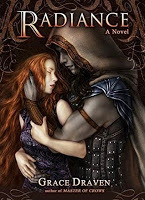 Radiance
by Grace Draven was one of those rare situations where Amazon made a recommendation that actually hit the mark – she's pegged as being somewhere along the lines of Jacqueline Carey and Storm Constantine (which is the equivalent of catnip for me). This is dark fantasy with a romantic spin, where we have a day/night type relationship. Two young people, Brishen (of the Kai people) and Ildiko (human) have an arranged marriage to solidify the political relations between their people. They weren't supposed to fall in love too... But they did. I eagerly await book two of the Wraith Kings.
Radiance
by Grace Draven was one of those rare situations where Amazon made a recommendation that actually hit the mark – she's pegged as being somewhere along the lines of Jacqueline Carey and Storm Constantine (which is the equivalent of catnip for me). This is dark fantasy with a romantic spin, where we have a day/night type relationship. Two young people, Brishen (of the Kai people) and Ildiko (human) have an arranged marriage to solidify the political relations between their people. They weren't supposed to fall in love too... But they did. I eagerly await book two of the Wraith Kings.
This book is sweet, but it’s not without its claws. The non-human race portrayed in this book (the Kai) are not cuddly, and their actions are quite bloody at times. They also make a lovely shift from vampires, elves or angels (I’d peg them as somewhat toothy, predatorial elves that don’t like going out during the day.) The human Ildiko may be soft and gentle on the outside but she has nerves of steel, and adapts quickly to her new people. By the end of the book, she’s a force to be reckoned with – while retaining her feminine qualities.
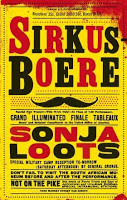 Sirkus Boere
by Sonja Loots is one of two Afrikaans books I read during 2015. Yes, I know I'm terrible that I hardly if ever read anything written in my mother tongue but then again, there's a dearth of fantasy fiction in Afrikaans. Sirkus Boere was set reading for my varsity module, but I enjoyed it anyway because Sonja's writing is oh so clever and the topic (the Anglo-Boer War) fascinates me.
Sirkus Boere
by Sonja Loots is one of two Afrikaans books I read during 2015. Yes, I know I'm terrible that I hardly if ever read anything written in my mother tongue but then again, there's a dearth of fantasy fiction in Afrikaans. Sirkus Boere was set reading for my varsity module, but I enjoyed it anyway because Sonja's writing is oh so clever and the topic (the Anglo-Boer War) fascinates me.
There are plenty of subtexts here. Mainly we deal with four main characters who're each trying to deal with the trauma of what they've lost during the war. Three of them get dragged off to be performers in a spectacle arranged by a circus showman. There's plenty of discussion about racism, colonialism, and how one overcomes the past. Do you embrace it? Walk away from it? Allow it to eat you up and paralyse you? What stories do you tell about your past?
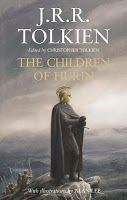 The Children of Húrin
by JRR Tolkien is one of those must-reads that has been languishing on my TBR pile for too long – until 2015, that is. In his usual fine, style, Tolkien takes the template for an ancient European myth and recasts it within Middle-earth. I am completely unashamedly a huge Tolkien fan. I am also aware that his writing is not perfect. But he's been part of my journey as reader and author since I was first able to read. Allow me this indulgence.
The Children of Húrin
by JRR Tolkien is one of those must-reads that has been languishing on my TBR pile for too long – until 2015, that is. In his usual fine, style, Tolkien takes the template for an ancient European myth and recasts it within Middle-earth. I am completely unashamedly a huge Tolkien fan. I am also aware that his writing is not perfect. But he's been part of my journey as reader and author since I was first able to read. Allow me this indulgence.
PS, if you’re emotionally correct and easily upset by bad stuff that happens to good people, go read about unicorns pooping rainbows. This book will make you very, very angry and you’ll probably ask for it to be banned from your library.
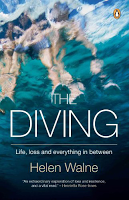 The Diving by Helen Walne is another of those books that doesn't full within my usual purview, but because it's my policy to read outside of my chosen genres from time to time, and because this one really hit me in all the feels, it deserves its spot here. I've been somewhat of a huge Helen Walne fan for years, and really enjoy her weekly columns in the Cape Argus. I also had fangrrrl moments whenever I bumped into her in the corridors of Independent Newspapers while I was still employed there. I mean, really – I had to stop myself from tripping over my tongue and telling her in a rush of words how fabulous I think she is.
The Diving by Helen Walne is another of those books that doesn't full within my usual purview, but because it's my policy to read outside of my chosen genres from time to time, and because this one really hit me in all the feels, it deserves its spot here. I've been somewhat of a huge Helen Walne fan for years, and really enjoy her weekly columns in the Cape Argus. I also had fangrrrl moments whenever I bumped into her in the corridors of Independent Newspapers while I was still employed there. I mean, really – I had to stop myself from tripping over my tongue and telling her in a rush of words how fabulous I think she is.
Helen’s observations are poignant and heartfelt – and she evokes her environment and the people who populate it with great vividness. In places, her signature humour is evident, tempered by her sorrow but redolent with incredible depth of feeling. This is not an easy book to read, because you know from the start what you’re in for, but as a personal account of those struggling in the aftermath of a suicide, it is rich in love despite the pain. And yes, the all-important letting go.
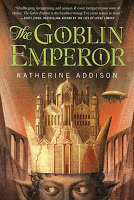 The Goblin Emperor
by Katherine Addison is a standalone fantasy (which is good news for those of you who're positively exhausted by all the trilogies and series out there). When a friend whose opinion I respect and whose good taste in literature I trust implicitly told me in no uncertain terms that I would enjoy this book, I went and bought it. I wasn't disappointed. Yes, it's a slow-moving courtly intrigue kinda tale, but I loved Maia's wide-eyed horror as he learns how to become an emperor immensely. Oh, yes, and elves and goblins. That is all.
The Goblin Emperor
by Katherine Addison is a standalone fantasy (which is good news for those of you who're positively exhausted by all the trilogies and series out there). When a friend whose opinion I respect and whose good taste in literature I trust implicitly told me in no uncertain terms that I would enjoy this book, I went and bought it. I wasn't disappointed. Yes, it's a slow-moving courtly intrigue kinda tale, but I loved Maia's wide-eyed horror as he learns how to become an emperor immensely. Oh, yes, and elves and goblins. That is all.
This is not a fast-moving novel by any measure. Katherine Addison’s prose is detailed and textured, and at times the array of names for people and places is bewildering (and possibly intentionally so, to create a sense of disorientation that Maia might feel at his situation). Yet the story is compelling, down to the last chapter, to be savoured for the rich world building and the slow weave of power play. The Goblin Emperor’s awarding of the 2015 Locus Award for “Best Fantasy Novel” is well deserved.
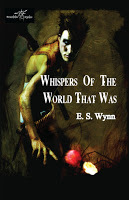 Whispers of the World that Wa
s by ES Wynn is a
Wraeththu Mythos
novel. Fans of dark fantasy and who've had their brush with Storm Constantine's worlds will not be disappointed. ES Wynn is a gifted author whose style reminds me a lot of Steve-and-Ghost era Poppy Z Brite. Oh, and don't read this book while you're hungry either.
Whispers of the World that Wa
s by ES Wynn is a
Wraeththu Mythos
novel. Fans of dark fantasy and who've had their brush with Storm Constantine's worlds will not be disappointed. ES Wynn is a gifted author whose style reminds me a lot of Steve-and-Ghost era Poppy Z Brite. Oh, and don't read this book while you're hungry either.
While those who’ve read the Chronicles and Histories will certainly get some of the more obscure canon references in Whispers of the World that Was, this knowledge is not a prerequisite, primarily because Tyse himself is largely ignorant of what it entails to be Wraeththu. All in all, this is a satisfying read, and a worthy addition to an established fantasy mythos that deviates from standard visions involving dragons, mages and elves.
While I welcome queries from authors and publishers seeking reviews (and I take pride in the fact that I will accept requests from self-published authors and small presses) my reading time at present is severely curtailed due to me having gone full time as a freelance designer and editor. I currently have a huge backlog and will therefore be incredibly picky about which books I accept. Please *do* read my review policy . Potential editing clients are also welcome to email me at nerinedorman@gmail.com – I am happy to provide a five-page sample, and offer a range of services, including proofing, manuscript assessment and developmental edits.
 Allegiance
by Beth Bernobich hit all the marks for me with a well-defined, diverse cast. This the third of her River of Souls fantasy trilogy filled with intrigue, magic and adventure. More than that I won't say. Ilse and Raul are most certainly unforgettable, and if you're looking for a richly textured, gradually unfolding saga, then this is the sort of tale that harks back to the classics.
Allegiance
by Beth Bernobich hit all the marks for me with a well-defined, diverse cast. This the third of her River of Souls fantasy trilogy filled with intrigue, magic and adventure. More than that I won't say. Ilse and Raul are most certainly unforgettable, and if you're looking for a richly textured, gradually unfolding saga, then this is the sort of tale that harks back to the classics.Not only am I drawn to her writing because of her solid worldbuilding, but also because she has created a society where there is less division between the roles played by men and women, and also a fluidity of sexuality. Women are soldiers, they can take on positions of power, and it doesn’t matter who you love. What else I adored was the fact that Bernobich breaks away from the Eurocentricism still prevalent in contemporary fantasy, to gift us with a saga that is distinctly Eastern in flavour without being heavy handed. – an extract from my review.
 Beastkeeper
by Cat Hellisen is another story that gave me the shivers. Cat has been one of my guiding lights and her writing is lush, nuanced and immersive. In Beastkeeper she retells "Beauty and the Beast", but from the point of Sarah, a lonely child whose parents have separated. She is sent to live with her remote grandmother, and discovers that her family harbours many secrets.
Beastkeeper
by Cat Hellisen is another story that gave me the shivers. Cat has been one of my guiding lights and her writing is lush, nuanced and immersive. In Beastkeeper she retells "Beauty and the Beast", but from the point of Sarah, a lonely child whose parents have separated. She is sent to live with her remote grandmother, and discovers that her family harbours many secrets.As always, Hellisen seems to effortlessly touch on the universality of fairy tales to delve even deeper and bring up underlying themes. One one level, this is a children’s quest to break a curse. On another, it’s a parable of how twisted love has soured to hate and indifference, and how one young person can find it in herself to step outside the trap of a destructive cycle. This is a dark, painful and elegant tale, made all the more beautiful, because Hellisen weaves with mystery and doesn’t hand over all the answers on a plate.
 Blood Song
by Anthony Ryan is book one of his Raven's Shadow trilogy, and has been one of my new discoveries in fantasy, and I've been gushing like a complete fangrrrl to anyone who's been within earshot. Anthony is an example of where self-publishing can lead to greater things, and this is coming-of-age story turns into a military fantasy that rubs shoulders with a fair amount of adventure and derring-do.
Blood Song
by Anthony Ryan is book one of his Raven's Shadow trilogy, and has been one of my new discoveries in fantasy, and I've been gushing like a complete fangrrrl to anyone who's been within earshot. Anthony is an example of where self-publishing can lead to greater things, and this is coming-of-age story turns into a military fantasy that rubs shoulders with a fair amount of adventure and derring-do.Ryan is relentless in what he has his characters endure, and the results are hardly convenient or tidy (as one can expect in an authentic setting). Expect bloodshed, violence and much death. Vaelin is a complex character whose actions aren’t always kind, but he is consistent in his logic, and I couldn’t help but admire him, even if I did not always agree with his decisions.
 Dragon Age: The World of Thedas Volume 1
by David Gaider, Ben Gelinas, Mike Laidlaw and Dave Marshall (editor) was oh so worth the effort of giving my money to BioWare (as I seem to be wont to do of late). I'm a huge fan of the game, not only because it's what I term as a fantasy RPG for Generation X, but because hells, the lore. So. Much. Lore. I'm a lore junkie. Also, this is just a really, really pretty book. And I'm unashamedly a fangrrrl.
Dragon Age: The World of Thedas Volume 1
by David Gaider, Ben Gelinas, Mike Laidlaw and Dave Marshall (editor) was oh so worth the effort of giving my money to BioWare (as I seem to be wont to do of late). I'm a huge fan of the game, not only because it's what I term as a fantasy RPG for Generation X, but because hells, the lore. So. Much. Lore. I'm a lore junkie. Also, this is just a really, really pretty book. And I'm unashamedly a fangrrrl.I've yet to write a full review, but if you're a collector of stuff to fulfil your inner geekness, this lovely hardcover book is what you need. The illustrations are beautiful and many of those little snippets of tomes and manuscripts that you encounter in-game are replicated here, along with other fascinating bits about the different nations, their people and its history.
 Radiance
by Grace Draven was one of those rare situations where Amazon made a recommendation that actually hit the mark – she's pegged as being somewhere along the lines of Jacqueline Carey and Storm Constantine (which is the equivalent of catnip for me). This is dark fantasy with a romantic spin, where we have a day/night type relationship. Two young people, Brishen (of the Kai people) and Ildiko (human) have an arranged marriage to solidify the political relations between their people. They weren't supposed to fall in love too... But they did. I eagerly await book two of the Wraith Kings.
Radiance
by Grace Draven was one of those rare situations where Amazon made a recommendation that actually hit the mark – she's pegged as being somewhere along the lines of Jacqueline Carey and Storm Constantine (which is the equivalent of catnip for me). This is dark fantasy with a romantic spin, where we have a day/night type relationship. Two young people, Brishen (of the Kai people) and Ildiko (human) have an arranged marriage to solidify the political relations between their people. They weren't supposed to fall in love too... But they did. I eagerly await book two of the Wraith Kings.This book is sweet, but it’s not without its claws. The non-human race portrayed in this book (the Kai) are not cuddly, and their actions are quite bloody at times. They also make a lovely shift from vampires, elves or angels (I’d peg them as somewhat toothy, predatorial elves that don’t like going out during the day.) The human Ildiko may be soft and gentle on the outside but she has nerves of steel, and adapts quickly to her new people. By the end of the book, she’s a force to be reckoned with – while retaining her feminine qualities.
 Sirkus Boere
by Sonja Loots is one of two Afrikaans books I read during 2015. Yes, I know I'm terrible that I hardly if ever read anything written in my mother tongue but then again, there's a dearth of fantasy fiction in Afrikaans. Sirkus Boere was set reading for my varsity module, but I enjoyed it anyway because Sonja's writing is oh so clever and the topic (the Anglo-Boer War) fascinates me.
Sirkus Boere
by Sonja Loots is one of two Afrikaans books I read during 2015. Yes, I know I'm terrible that I hardly if ever read anything written in my mother tongue but then again, there's a dearth of fantasy fiction in Afrikaans. Sirkus Boere was set reading for my varsity module, but I enjoyed it anyway because Sonja's writing is oh so clever and the topic (the Anglo-Boer War) fascinates me.There are plenty of subtexts here. Mainly we deal with four main characters who're each trying to deal with the trauma of what they've lost during the war. Three of them get dragged off to be performers in a spectacle arranged by a circus showman. There's plenty of discussion about racism, colonialism, and how one overcomes the past. Do you embrace it? Walk away from it? Allow it to eat you up and paralyse you? What stories do you tell about your past?
 The Children of Húrin
by JRR Tolkien is one of those must-reads that has been languishing on my TBR pile for too long – until 2015, that is. In his usual fine, style, Tolkien takes the template for an ancient European myth and recasts it within Middle-earth. I am completely unashamedly a huge Tolkien fan. I am also aware that his writing is not perfect. But he's been part of my journey as reader and author since I was first able to read. Allow me this indulgence.
The Children of Húrin
by JRR Tolkien is one of those must-reads that has been languishing on my TBR pile for too long – until 2015, that is. In his usual fine, style, Tolkien takes the template for an ancient European myth and recasts it within Middle-earth. I am completely unashamedly a huge Tolkien fan. I am also aware that his writing is not perfect. But he's been part of my journey as reader and author since I was first able to read. Allow me this indulgence.PS, if you’re emotionally correct and easily upset by bad stuff that happens to good people, go read about unicorns pooping rainbows. This book will make you very, very angry and you’ll probably ask for it to be banned from your library.
 The Diving by Helen Walne is another of those books that doesn't full within my usual purview, but because it's my policy to read outside of my chosen genres from time to time, and because this one really hit me in all the feels, it deserves its spot here. I've been somewhat of a huge Helen Walne fan for years, and really enjoy her weekly columns in the Cape Argus. I also had fangrrrl moments whenever I bumped into her in the corridors of Independent Newspapers while I was still employed there. I mean, really – I had to stop myself from tripping over my tongue and telling her in a rush of words how fabulous I think she is.
The Diving by Helen Walne is another of those books that doesn't full within my usual purview, but because it's my policy to read outside of my chosen genres from time to time, and because this one really hit me in all the feels, it deserves its spot here. I've been somewhat of a huge Helen Walne fan for years, and really enjoy her weekly columns in the Cape Argus. I also had fangrrrl moments whenever I bumped into her in the corridors of Independent Newspapers while I was still employed there. I mean, really – I had to stop myself from tripping over my tongue and telling her in a rush of words how fabulous I think she is.Helen’s observations are poignant and heartfelt – and she evokes her environment and the people who populate it with great vividness. In places, her signature humour is evident, tempered by her sorrow but redolent with incredible depth of feeling. This is not an easy book to read, because you know from the start what you’re in for, but as a personal account of those struggling in the aftermath of a suicide, it is rich in love despite the pain. And yes, the all-important letting go.
 The Goblin Emperor
by Katherine Addison is a standalone fantasy (which is good news for those of you who're positively exhausted by all the trilogies and series out there). When a friend whose opinion I respect and whose good taste in literature I trust implicitly told me in no uncertain terms that I would enjoy this book, I went and bought it. I wasn't disappointed. Yes, it's a slow-moving courtly intrigue kinda tale, but I loved Maia's wide-eyed horror as he learns how to become an emperor immensely. Oh, yes, and elves and goblins. That is all.
The Goblin Emperor
by Katherine Addison is a standalone fantasy (which is good news for those of you who're positively exhausted by all the trilogies and series out there). When a friend whose opinion I respect and whose good taste in literature I trust implicitly told me in no uncertain terms that I would enjoy this book, I went and bought it. I wasn't disappointed. Yes, it's a slow-moving courtly intrigue kinda tale, but I loved Maia's wide-eyed horror as he learns how to become an emperor immensely. Oh, yes, and elves and goblins. That is all.This is not a fast-moving novel by any measure. Katherine Addison’s prose is detailed and textured, and at times the array of names for people and places is bewildering (and possibly intentionally so, to create a sense of disorientation that Maia might feel at his situation). Yet the story is compelling, down to the last chapter, to be savoured for the rich world building and the slow weave of power play. The Goblin Emperor’s awarding of the 2015 Locus Award for “Best Fantasy Novel” is well deserved.
 Whispers of the World that Wa
s by ES Wynn is a
Wraeththu Mythos
novel. Fans of dark fantasy and who've had their brush with Storm Constantine's worlds will not be disappointed. ES Wynn is a gifted author whose style reminds me a lot of Steve-and-Ghost era Poppy Z Brite. Oh, and don't read this book while you're hungry either.
Whispers of the World that Wa
s by ES Wynn is a
Wraeththu Mythos
novel. Fans of dark fantasy and who've had their brush with Storm Constantine's worlds will not be disappointed. ES Wynn is a gifted author whose style reminds me a lot of Steve-and-Ghost era Poppy Z Brite. Oh, and don't read this book while you're hungry either.While those who’ve read the Chronicles and Histories will certainly get some of the more obscure canon references in Whispers of the World that Was, this knowledge is not a prerequisite, primarily because Tyse himself is largely ignorant of what it entails to be Wraeththu. All in all, this is a satisfying read, and a worthy addition to an established fantasy mythos that deviates from standard visions involving dragons, mages and elves.
While I welcome queries from authors and publishers seeking reviews (and I take pride in the fact that I will accept requests from self-published authors and small presses) my reading time at present is severely curtailed due to me having gone full time as a freelance designer and editor. I currently have a huge backlog and will therefore be incredibly picky about which books I accept. Please *do* read my review policy . Potential editing clients are also welcome to email me at nerinedorman@gmail.com – I am happy to provide a five-page sample, and offer a range of services, including proofing, manuscript assessment and developmental edits.
Published on January 25, 2016 11:36
January 14, 2016
The Boer War by Thomas Pakenham #review
Title:
The Boer War
Author: Thomas Pakenham
Publisher: Jonathan Ball Publishers, 1993
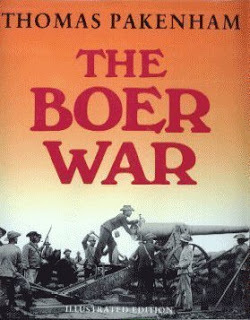 Granted, I started reading this book because I wanted a better idea of the Anglo Boer War for my Afrikaans module during my first level at Unisa for my BA, so this was pretty much supplementary reading – which means I was more consistent about finishing what I started. Plainly put, The Boer War by Thomas Pakenham (which is apparently considered a “go to” for the subject) is very, very dry. And that’s putting it mildly.
Granted, I started reading this book because I wanted a better idea of the Anglo Boer War for my Afrikaans module during my first level at Unisa for my BA, so this was pretty much supplementary reading – which means I was more consistent about finishing what I started. Plainly put, The Boer War by Thomas Pakenham (which is apparently considered a “go to” for the subject) is very, very dry. And that’s putting it mildly.
Informative, yes, but I had to do my reading in bursts.
That Pakenham did his research is clear, because he’s sifted through a daunting pile of primary sources to put together a fine tome that definitely succeeds in giving me a better idea of the entire debacle. Also, I feel that he succeeds in a degree of objectivity on such a contentious topic because when it comes to exposing the foibles of those involved in the conflict, he doesn’t pick sides. Both the British and the Boers are revealed as perpetrators (and most certainly not very nice people), and both sides have their heroes and villains, depending the perspective of the viewer.
Pakenham also examines the outcomes of the war, and it’s incredibly high cost in lives and material possessions; South Africa’s indigenous populations suffered the most. If one has to look from where the roots of the later oppressive apartheid system grew, they clearly lay deeply entrenched in this time, especially in the attitudes shared by colonial powers in Africa. Thank you, Rhodes, Kruger. You’re both scoundrels, and not the nice kind of scoundrel either (like Han Solo).
As an overview, I feel this book is a good starting point, but as stated earlier, I simply didn’t gel with Pakenham, who failed to engage me. What made reading this bearable is that I have an illustrated hardcover edition that had many wonderful images (yay for pictures) – but if and when I do decide to read further on the topic, I’d like to find an author whose writing style doesn’t make me unintentionally skip pages.
Author: Thomas Pakenham
Publisher: Jonathan Ball Publishers, 1993
 Granted, I started reading this book because I wanted a better idea of the Anglo Boer War for my Afrikaans module during my first level at Unisa for my BA, so this was pretty much supplementary reading – which means I was more consistent about finishing what I started. Plainly put, The Boer War by Thomas Pakenham (which is apparently considered a “go to” for the subject) is very, very dry. And that’s putting it mildly.
Granted, I started reading this book because I wanted a better idea of the Anglo Boer War for my Afrikaans module during my first level at Unisa for my BA, so this was pretty much supplementary reading – which means I was more consistent about finishing what I started. Plainly put, The Boer War by Thomas Pakenham (which is apparently considered a “go to” for the subject) is very, very dry. And that’s putting it mildly.Informative, yes, but I had to do my reading in bursts.
That Pakenham did his research is clear, because he’s sifted through a daunting pile of primary sources to put together a fine tome that definitely succeeds in giving me a better idea of the entire debacle. Also, I feel that he succeeds in a degree of objectivity on such a contentious topic because when it comes to exposing the foibles of those involved in the conflict, he doesn’t pick sides. Both the British and the Boers are revealed as perpetrators (and most certainly not very nice people), and both sides have their heroes and villains, depending the perspective of the viewer.
Pakenham also examines the outcomes of the war, and it’s incredibly high cost in lives and material possessions; South Africa’s indigenous populations suffered the most. If one has to look from where the roots of the later oppressive apartheid system grew, they clearly lay deeply entrenched in this time, especially in the attitudes shared by colonial powers in Africa. Thank you, Rhodes, Kruger. You’re both scoundrels, and not the nice kind of scoundrel either (like Han Solo).
As an overview, I feel this book is a good starting point, but as stated earlier, I simply didn’t gel with Pakenham, who failed to engage me. What made reading this bearable is that I have an illustrated hardcover edition that had many wonderful images (yay for pictures) – but if and when I do decide to read further on the topic, I’d like to find an author whose writing style doesn’t make me unintentionally skip pages.
Published on January 14, 2016 06:27
January 12, 2016
Tower Lord (Raven's Shadow #2) by Anthony Ryan #review
Title:
Tower Lord (Raven’s Shadow #2)
Author: Anthony Ryan
Publisher: Ace, 2014
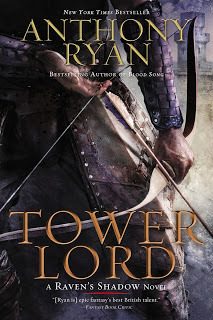 While book one of Anthony Ryan’s Raven’s Shadow trilogy, Blood Song, is a coming-of-age story involving the young man Vaelin Al Sorna, and his rise as one of the greatest military leaders in the realm, Tower Lord diversifies the saga by adding fresh voices to the mix. To avoid spoilers, there’s an old (and favourite) individual from book one who makes a reappearance (no, he’s not dead, as you thought, and that’s all I’ll say), as well as the addition of two women who both show that they are not stereotypical damsels in distress.
While book one of Anthony Ryan’s Raven’s Shadow trilogy, Blood Song, is a coming-of-age story involving the young man Vaelin Al Sorna, and his rise as one of the greatest military leaders in the realm, Tower Lord diversifies the saga by adding fresh voices to the mix. To avoid spoilers, there’s an old (and favourite) individual from book one who makes a reappearance (no, he’s not dead, as you thought, and that’s all I’ll say), as well as the addition of two women who both show that they are not stereotypical damsels in distress.
Those hoping for the bulk of the story being told from Vaelin’s point of view will necessarily be disappointed, because his role is reduced to being assigned the duty of Tower Lord of the Northern Reaches, who then unites disparate groups in an army that then travels across the land to fight a great battle. I support Ryan’s decision to add new characters, because to a degree, the greater part of Vaelin’s achievements have already reached a peak in book one. To push for more would mean falling into the trap of “Too Much Awesome”, a flaw in many fantasy trilogies (You’ve rescued the princess – now what?). Though Vaelin is nonetheless a key figure in all that transpires in Tower Lord, the other three new viewpoint characters are given the opportunity to show that their roles are equally game changing when the realm is invaded, and its people are hard pressed to fight off enslavement.
Just like its predecessor, Tower Lord is red in tooth and claw, and is military fantasy to the highest order, with just a dab of magic for added spice (if you’re expecting dragons and elves, this is not for you). As always, Vaelin is drawn unerringly by his own magical “blood song”, as he calls it, which aids him in facing down impossible odds to pull off a rescue no ordinary person would even dare attempt. Reva and Princess Lyrna are well rounded out, and their story arcs are at times nail biting, because Ryan doesn’t spare them any grief.
There isn’t much to nitpick with Tower Lord apart from the fact that it clearly suffers book two syndrome in that it’s a continuation of events in book one with foreshadowing for events in book three – which means it feels unfinished, and the pacing might not have the same sense of urgency and energy present in book one. The writing, however, is tight and Ryan succeeds in offering his fans exactly what they’re looking for – a stonking good fantasy epic.
Author: Anthony Ryan
Publisher: Ace, 2014
 While book one of Anthony Ryan’s Raven’s Shadow trilogy, Blood Song, is a coming-of-age story involving the young man Vaelin Al Sorna, and his rise as one of the greatest military leaders in the realm, Tower Lord diversifies the saga by adding fresh voices to the mix. To avoid spoilers, there’s an old (and favourite) individual from book one who makes a reappearance (no, he’s not dead, as you thought, and that’s all I’ll say), as well as the addition of two women who both show that they are not stereotypical damsels in distress.
While book one of Anthony Ryan’s Raven’s Shadow trilogy, Blood Song, is a coming-of-age story involving the young man Vaelin Al Sorna, and his rise as one of the greatest military leaders in the realm, Tower Lord diversifies the saga by adding fresh voices to the mix. To avoid spoilers, there’s an old (and favourite) individual from book one who makes a reappearance (no, he’s not dead, as you thought, and that’s all I’ll say), as well as the addition of two women who both show that they are not stereotypical damsels in distress.Those hoping for the bulk of the story being told from Vaelin’s point of view will necessarily be disappointed, because his role is reduced to being assigned the duty of Tower Lord of the Northern Reaches, who then unites disparate groups in an army that then travels across the land to fight a great battle. I support Ryan’s decision to add new characters, because to a degree, the greater part of Vaelin’s achievements have already reached a peak in book one. To push for more would mean falling into the trap of “Too Much Awesome”, a flaw in many fantasy trilogies (You’ve rescued the princess – now what?). Though Vaelin is nonetheless a key figure in all that transpires in Tower Lord, the other three new viewpoint characters are given the opportunity to show that their roles are equally game changing when the realm is invaded, and its people are hard pressed to fight off enslavement.
Just like its predecessor, Tower Lord is red in tooth and claw, and is military fantasy to the highest order, with just a dab of magic for added spice (if you’re expecting dragons and elves, this is not for you). As always, Vaelin is drawn unerringly by his own magical “blood song”, as he calls it, which aids him in facing down impossible odds to pull off a rescue no ordinary person would even dare attempt. Reva and Princess Lyrna are well rounded out, and their story arcs are at times nail biting, because Ryan doesn’t spare them any grief.
There isn’t much to nitpick with Tower Lord apart from the fact that it clearly suffers book two syndrome in that it’s a continuation of events in book one with foreshadowing for events in book three – which means it feels unfinished, and the pacing might not have the same sense of urgency and energy present in book one. The writing, however, is tight and Ryan succeeds in offering his fans exactly what they’re looking for – a stonking good fantasy epic.
Published on January 12, 2016 05:38



